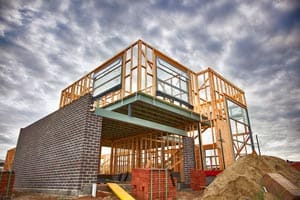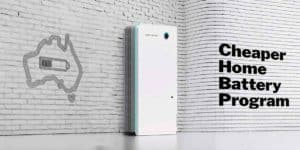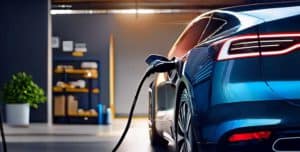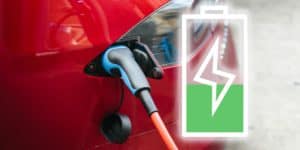
Hot Water

Energy Saving Guide
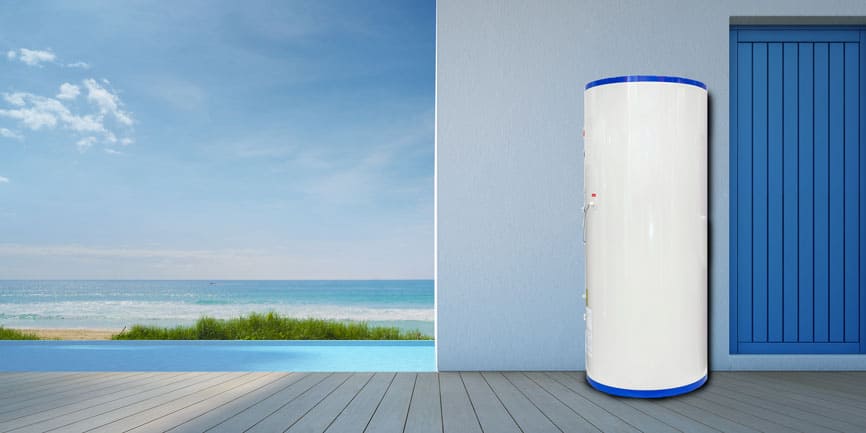
Hot water energy saving
Up to a quarter of energy costs in Australian homes are to heat water!
How you heat water in your home is something that you’ll want to look at if you want to save money on energy. While a hot water system (HWS) may cost as much to replace as all the major appliances in the kitchen and laundry combined, it can have a bigger impact on your annual energy bill.
Hot water essentials
1. How to trim hot water costs
Install efficient showerheads
Low flow showerheads are one those rare smoke and mirror tricks that work. The shower feels just as luxurious – while reducing the amount of hot water needed to enjoy a shower. Find a good low flow showerhead and you’ll discover that you don’t need to compromise comfort to save energy. Especially recommended for those with teenagers!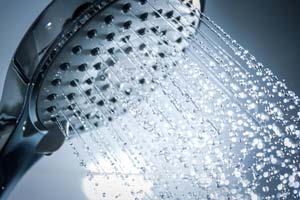
Get lean with the washing machine
Front-loaders used about half the water of top loaders – saving on hot water. Even better, opting for cold or warm (30c) wash cycles reduces the need to heat water.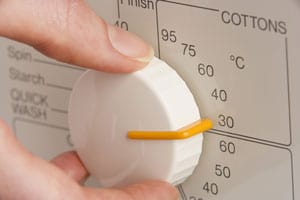
Set the thermostat at 60C
Check that your thermostat on your water heater is set to 60C and no more than 65C. Any warmer and your hot water system is working overtime to heat water more than needed. If there’s no thermostat on the exterior of system, you can always use a thermometer to measure the temperature of hot water from the tap. Run the tap for a couple of minutes to get an accurate reading. If it’s too hot, you may be able to adjust the unit yourself or have a plumber correct it. When extra guests stay you can always raise the temperature to heat more water – don’t forget to turn it back when they’ve left.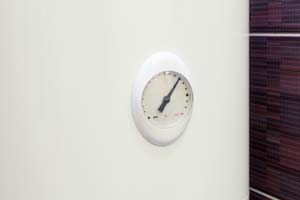
Heat when power is cheaper
Electric storage units are expensive to run. So, you’ll want to make sure you’re on the cheapest tariff. By connecting your hot water to a dedicated circuit in your meter box you can access controlled load (Tariff 31) rates enabling you to pay the lowest electricity charges. If you can’t connect to a controlled load circuit, then a timer can schedule the HWS to operate off-peak, when tariffs are lower. If you have a rooftop PV system you might consider installing an electrical diverter to push excess solar to your hot water unit. You’ll want to run the calculations on your feed-in tariff and level of export to figure out if this is the best ROI for you.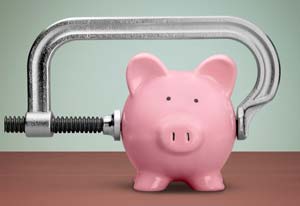
2. Hot water system buying tips
Get the right size
If you are about to buy a HWS you’ll want to consider how much hot water you’ll use (see chart below as a guide). Too little storage/heating capacity and it’s cold showers. Too much storage and you’re paying to heat water you aren’t using. You’ll also want to think about where you live.
| Storage Hot Water | Instantaneous Hot Water | ||
|---|---|---|---|
| Size of household | Size of tank (litres) | Number of taps used at the same time | Flow rate (litres/minute) |
| 1-2 people | 90 | 1 | 16 |
| 3-4 people | 130 | 2 | 20 |
| 3-5 people | 170 | 3 | 24 |
| 4-6 people | 200 | 3+ | 32 |
| 5-9 people | 270 | ||
Location, location
In colder areas, you may want a bigger storage system as hot water use is typically higher. Instantaneous units also need to have higher capacity in colder areas. This is because they typically can only heat water up to 25C when running at their maximum flow rate – which isn’t really hot water. Choosing a larger unit, running with reduced flow, will enable water to be heated to 40C or more. Ideally, you’ll want to locate the hot water unit close to your laundry, kitchen and bathrooms. This will minimise heat loss between the heating unit and the outlet.
3. Your hot water options
Choices, choices
When it comes to choosing a hot water systems there is a wide range of technologies available, including;- Gas Storage
- Instantaneous Gas
- Electric Storage
- Instantaneous Electric
- Solar (include gas and electric boosted systems)
- Electric Heat Pumps

Gas storage and instantaneous hot water
Up till now, gas has been many peoples go-to for water heating. Instantaneous gas heaters are popular because they only heat the water you need, and won’t run out like storage solution. Where gas is cheap, this is the lowest-cost option for many households. But we think, it’s less likely to be how the future plays out. Ultimately, if you are interested in energy efficiency and the ability to reduce your energy costs – then gas has a problem. It locks you into old technology and paying the going rate for fuel. Unlike electricity where you can generate your own energy from solar. It’s unlikely we’ll ever see gas prices getting cheaper. Cost of gas water heaters: $800-$2000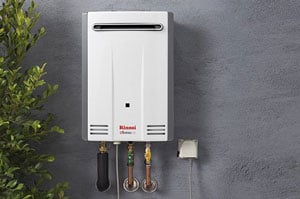
Electric storage and instantaneous hot water
Like a giant kettle, electric storage HWS uses an element inside a metal tank to heat water. Around one in four Aussie homes use electric storage, but the elements aren’t very efficient, requiring a lot of energy to keep a large tank warm. Less common are electric instantaneous HWS. These require three-phase power because of the high energy demands. There may be some situations where a continuous hot water system may be desirable or where hot water is rarely used. Cost of electric water heaters: $300-$2000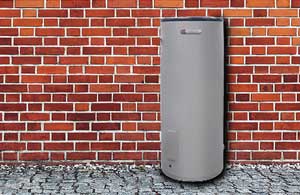
Solar hot water
Typically installed on the rooftop, solar hot water systems use the sun’s radiation for heating water. It’s no surprise that they use up to 90% less energy than mains powered systems when the sun is shining strongly. Solar thermal systems require a water tank installed on the roof (roof-mounted system) or the ground (split system). There are two solar technologies, with the option to add an electric or gas booster. Flat plate collectors: Absorb radiation from the sun through dark glass panels. As water absorbs heat, it rises through the pipes and flows into the water tank for storage. Flat plate collectors rely entirely upon on the sun, so need good solar orientated. Performance declines significantly on cloudy or cold days. Evacuated tubes: By employing a round tube to focus the suns radiation, solar systems with evacuated tubes are more efficient for heating water. However, this comes at a higher purchase cost.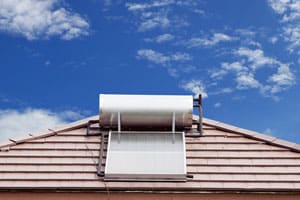
Flat plate solar hot water system roof mounted
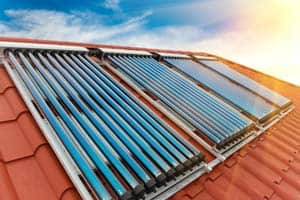
Boosting your solar. The issue with solar hot water systems is that it is reliant on the sun to heat water to the required temperature. Of course, the sun isn’t constant. That’s why a Solar Boost solar system is essential. This includes a gas or electric element to kick your hot water along when needed.
Cost of solar water heaters: $3000-$7000

The solar dilemma
Solar hot water offers the cheapest running cost by a long way. With a booster for those already connected to gas, it’s super cheap – and it’s still compelling with an electric boost. However, if a home has sunlit roof space available, and doesn’t yet have solar PV, it’s typically a better buy installing solar PV panels. This will generate power to heat water, AND warm and cool the home, AND run appliances, giving you the potential for more power savings and energy independence. If you already have solar or are thinking of adding PV panels to your rooftop – then moving to efficient electric heat pumps can be an effective strategy.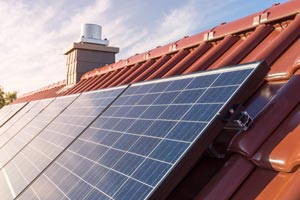
Solar PV panels
Heat pump water heaters
Heat pumps are very efficient. By using the same principle as reverse cycle air conditioners, they consume less than half of the energy of a conventional electric HWS. Most of the energy used to heat the water is extracted from the air. Then, as the ambient temperature rises, efficiency improves. Unlike solar, heat pump HWS keep working even when the sun isn’t shining. They can installed in any exterior location – even shaded spots and don’t require roof access. Heat pumps are less efficient in cold climates (think Tasmania, Victoria and the dividing range), so check their effectiveness if you live in these climate zones. To minimize the running costs of a heat pump HWS you’ll want to schedule a heat pump to run in the warmest part of the day (11am – 3pm). For solar owners, this is perfect as solar generation is usually at its peak at this time. Cost of heat pump water heaters: $2,400-$4,000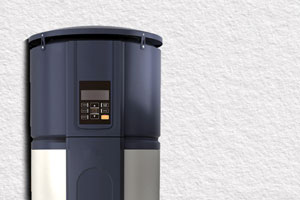
Heat pump electric hot water unit

Game changers: Pump up the heat
We’ve had a heat pump hot water system for 6 years. It’s scheduled to start running at 12pm in daylight saving time (AEDT) and 11am for the rest of the year (AEST) – when our solar PV panels are generating plenty of energy. In summer, the heat pump unit is finished heating in around 1.5 hours – having used just 1.5kWh for a family of 3. In winter, the run time can be up to 3 hours or ~3kWh. As we have a large 10kW solar PV system, on all but the darkest of days, the heat pump will run completely off power generated by our solar PV system.4. Hot water running cost comparison
So how do the different fuels and technologies stack up? Sustainability Victoria calculated annual energy costs to heat water for a 3 person home, using standard efficiency appliances. This doesn’t include supply charges for gas or electricity, as these would be shared across multiple uses (heating, cooking, laundry etc). The relativities will vary in tropical climate zones where heat pump and solar are even more efficient.
Hot water system cost comparison
| Water Heater | Annual estimated cost* |
|---|---|
| Solar with gas boost | $85 |
| Heat pump (off peak) | $250 |
| Solar with electric boost (off peak) | $265 |
| Gas Instantaneous (5.5 star) | $340 |
| Heat pump (peak) | $385 |
| Gas storage (4 star) | $415 |
| Electric Storage (off peak) | $700 |
| Electric Instantaneous | $780 |
5. Which hot water system is best for my home?
What’s cheapest to go with depends on your situation. Extensive cost modelling for a range of different households across Australia in the 2018 ATA Household Fuel Choice study showed the best ROI for each scenario. Here’s the essential summary.
Existing home running gas HWS, heating and cooking?
Stick with gas for now. If you use gas and plan to keep it for heating and cooking, with no plans for solar – then sticking with gas hot water works out cheaper, particularly in colder climates where gas prices are relatively low.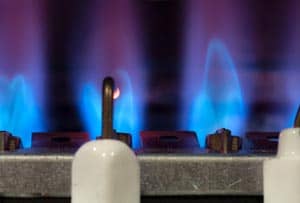
Existing home with solar
Harness your solar to run your HWS. As feed-in tariffs fall households will want to consume more of the cheap electricity generated from their rooftops. Existing electric storage units are energy hungry, pulling 2-3kW+ an hour. A heat pump or electric boosted solar will reduce the load on your PV system.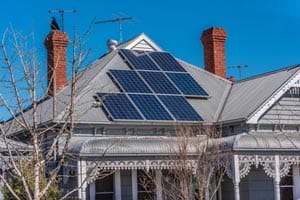
Hot water fails and it’s the last gas appliance?
Go electric. If your hot water system is due for replacement, and it’s the only appliance you have connected to gas, it’s better to upgrade to an efficient electric hot water unit. The ATA Household Fuel Choice analysis found that across Australia, even in Hobart, cutting gas and the fixed supply charge that comes with it, leaves a household better off to the tune of at least $1,000 (NPV) over 10 years. Cutting gas will save around $300 annually in fixed costs. Select an efficient electric HWS – like solar (electric boosted) or heat pump.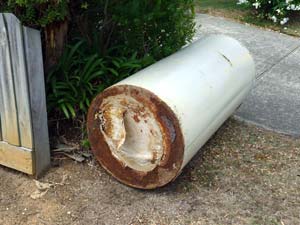
Building a new home?
Don’t connect to gas and go all-electric with solar. The ATA Household Fuel Choice study found that for all locations in Australia, even in cold climates where gas is cheaper, you’re better off to the tune of $10,000 to $18,000 over 10 years with an all-electric home with solar. Cutting the fixed supply charge on gas and marrying efficient appliances (like heat pumps) with solar makes the electric home the hands-down winner.